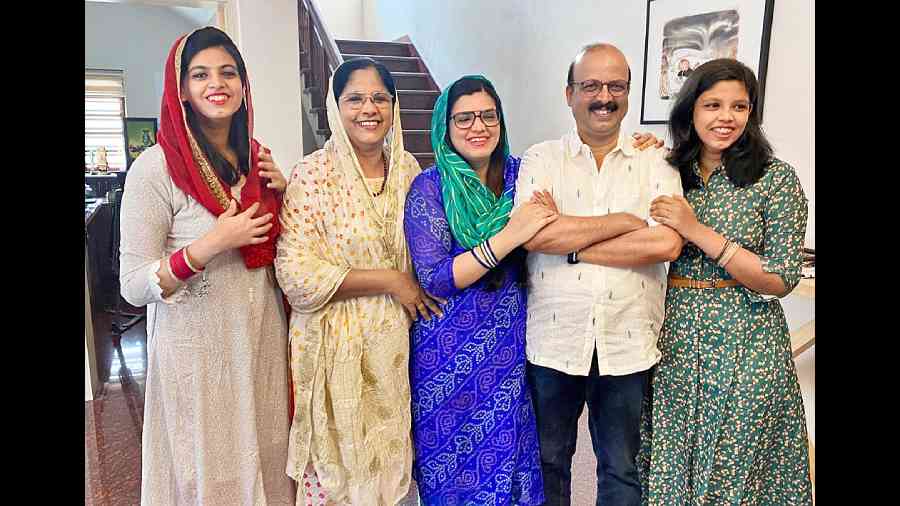A Muslim couple wedded for 29 years married again on Wednesday — this time under the Special Marriage Act — to ensure that their three daughters automatically inherit their assets in entirety, which would not have been possible under the Muslim personal law.
Sheena Shukkur, 51, head of the law department at Kannur University, and her lawyer husband C. Shukkur, 53, registered their marriage under the Special Marriages Act at the sub-registrar’s office in Hosdurg in Kerala’s Kasaragod district in the presence of their family, friends and three daughters.
The couple had a nikah under the Muslim personal law on October 6, 1994.
The much-talked-about “second marriage” of the couple was held on Women’s Day to send a message that Muslim girls should have equal rights in the inheritance of their parents, a provision that is absent in the Muslim Personal Law (Shariat) Application Act of 1937.
“This is not just about our daughters. This is a step for gender justice and that’s why we chose this day,” Sheena told reporters after registering the marriage on Wednesday.
“Through this, we are sending the message on social status and equal rights in inheritance,” said Shukkur.
His Facebook announcement on Sunday about his second marriage sparked a lot of interest as he is also an occasional film actor who shot to fame for his role as a lawyer in the hit movie Nna Thaan Case Kodu (translates to You sue me then).
“Our daughters will inherit only two-thirds of our assets. The remaining one portion is for our siblings… The only reason for this is that we don’t have a son. If we had a son our children would have inherited all our assets,” Shukkur explained in a Facebook post on Monday.
The lawyer on Wednesday shared a statement from Council for Fatwa & Research based in Malappuram that decried the marriage.
“Those who believe in the creator and follow all of his laws won’t have any concerns (in accepting the Muslim personal law),” it stated. Oscar-winning sound designer Resul Pookutty was among those who lauded Shukkur.
“Today, the step he has taken is an eye-opener to every liberal Muslim in this country. I couldn’t be there with him for his ‘second marriage’ but I’m there with him in spirit and the courageous stand he has taken.”
While Shukkur received immense support from many Muslims, there were some who questioned the need for the marriage under the Special Marriages Act as he was already married as per religious rites.
Yet others wondered why Shukkur couldn’t “gift” his property equally to his three daughters.
Some saw in the development an opportunity to endorse the BJP’s Uniform Civil Code proposal that has been gathering dust for years. But the lawyer and his wife dismissed all those questions, asserting that their second marriage was about equality and dignity of Muslim women.
“India is a signatory to the UN’s Human Rights Declaration in 1948. Article 14, which is the core of our Constitution, provides the right to quality. Our only interest is that Muslim girls should not be left out of that process of human rights and right to equality. This fight is about that and not against Islamic Shariat,” Shukkur clarified.
He further explained the reason for the marriage in the Facebook post.
“The reason (why his daughters won’t get equal share of the inheritance) is the Muslim Personal Law (Shariat) Application Act of 1937. As per this law, the inheritance of Indian Muslims are governed by the Muslim Personal Law or Shariat. But the 1937 law doesn’t define it.”
The Indian Succession Act, 1925, will kick in once they marry under the Special Marriage Act, which would then override their marriage under the Muslim personal law.
“Section 15 of the Special Marriages Act, 1954, empowers anyone married under any other religious rites to register their marriage again. So we don’t have to divorce to marry again,” he said.
“The only conditions laid down in the law is that the couple should be at least 21 years of age, should have lived together all along and should be mentally stable,” said the lawyer.
He silenced critics who questioned whether he had benefited from the Shariat inheritance law.
“My father is alive and happy. But when my mother passed away we five children — three of us men — had split her assets equally,” he said.

